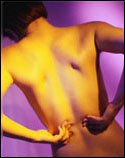
Poor Posture
Your posture is second nature to you, a taken-for-granted habit. This means that you have control of it. Often, poor posture develops because of accidents or falls. However, poor posture usually develops from environmental factors or bad habits.
Poor posture can start a progression of symptoms in the average adult. It can start with fatigue, tightness and joint stiffness.
If you have poor posture, your muscles have to work hard just to hold you up if you have poor posture. You waste energy just moving, leaving you without the extra energy you need to feel good.
A lifetime of poor posture can cause changes in your muscles and ligaments and you may have a stiffness, tightness and painful feeling. Majority of the spine-related problems are the result of muscles changes brought on by years of bad posture.
Poor posture and limited spinal mobility increase the likelihood of the degenerative osteoarthritis in later years.
When you have poor posture, the body's proper vertical position is out of alignment and the back's natural curves become distorted.
Head Forward or Slouched Posture:
Rounded shoulders
Head forward, rounded upper back
Arched lower back
Protruding buttocks
Chest flattens
Abdominal organs sag, crowding and making more work for heart and lungs
Seen often in women who have osteoporosis in later years
Military posture
Head pulled back
Shoulder blades tightly pulled back
Arched lower back
Arched lower back
Knees locked (straight)
Minimizes the spinal column's ability to be a shock absorber for the body
Slumped sitting posture
Upper back humped or too rounded
Head forward
Rounded lower back
Often starts in teenage years
By GlobalSpine.net
http://www.globalspine.net/poor_posture.html









